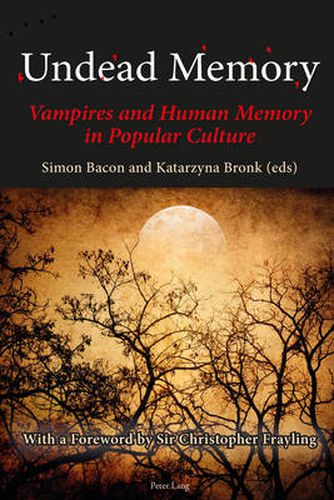Readings Newsletter
Become a Readings Member to make your shopping experience even easier.
Sign in or sign up for free!
You’re not far away from qualifying for FREE standard shipping within Australia
You’ve qualified for FREE standard shipping within Australia
The cart is loading…






This title is printed to order. This book may have been self-published. If so, we cannot guarantee the quality of the content. In the main most books will have gone through the editing process however some may not. We therefore suggest that you be aware of this before ordering this book. If in doubt check either the author or publisher’s details as we are unable to accept any returns unless they are faulty. Please contact us if you have any questions.
Vampires have never been as popular in Western culture as they are now: Twilight, True Blood, The Vampire Diaries and their fans have secured the vampire’s place in contemporary culture. Yet the role vampires play in how we remember our pasts and configure our futures has yet to be explored. The present volume fills this gap, addressing the many ways in which vampire narratives have been used to describe the tensions between memory and identity in the twentieth and twenty-first centuries.
The first part of the volume considers the use of the vampire to deal with rapid cultural change, both to remember the past and to imagine possible futures. The second part examines vampire narratives as external cultural archives, a memory library allowing us to reference the past and understand how this underpins our present. Finally, the collection explores how the undead comes to embody memorial practice itself: an autonomous entity that gives form to traumatic, feminist, postcolonial and oral traditions and reveals the resilience of minority memory.
Ranging from actual reports of vampire activity to literary and cinematic interpretations of the blood-drinking revenant, this timely study investigates the ways in which the undead memory of the vampire throughout Western culture has helped us to remember more clearly who we were, who we are, and who we will/may become.
$9.00 standard shipping within Australia
FREE standard shipping within Australia for orders over $100.00
Express & International shipping calculated at checkout
This title is printed to order. This book may have been self-published. If so, we cannot guarantee the quality of the content. In the main most books will have gone through the editing process however some may not. We therefore suggest that you be aware of this before ordering this book. If in doubt check either the author or publisher’s details as we are unable to accept any returns unless they are faulty. Please contact us if you have any questions.
Vampires have never been as popular in Western culture as they are now: Twilight, True Blood, The Vampire Diaries and their fans have secured the vampire’s place in contemporary culture. Yet the role vampires play in how we remember our pasts and configure our futures has yet to be explored. The present volume fills this gap, addressing the many ways in which vampire narratives have been used to describe the tensions between memory and identity in the twentieth and twenty-first centuries.
The first part of the volume considers the use of the vampire to deal with rapid cultural change, both to remember the past and to imagine possible futures. The second part examines vampire narratives as external cultural archives, a memory library allowing us to reference the past and understand how this underpins our present. Finally, the collection explores how the undead comes to embody memorial practice itself: an autonomous entity that gives form to traumatic, feminist, postcolonial and oral traditions and reveals the resilience of minority memory.
Ranging from actual reports of vampire activity to literary and cinematic interpretations of the blood-drinking revenant, this timely study investigates the ways in which the undead memory of the vampire throughout Western culture has helped us to remember more clearly who we were, who we are, and who we will/may become.